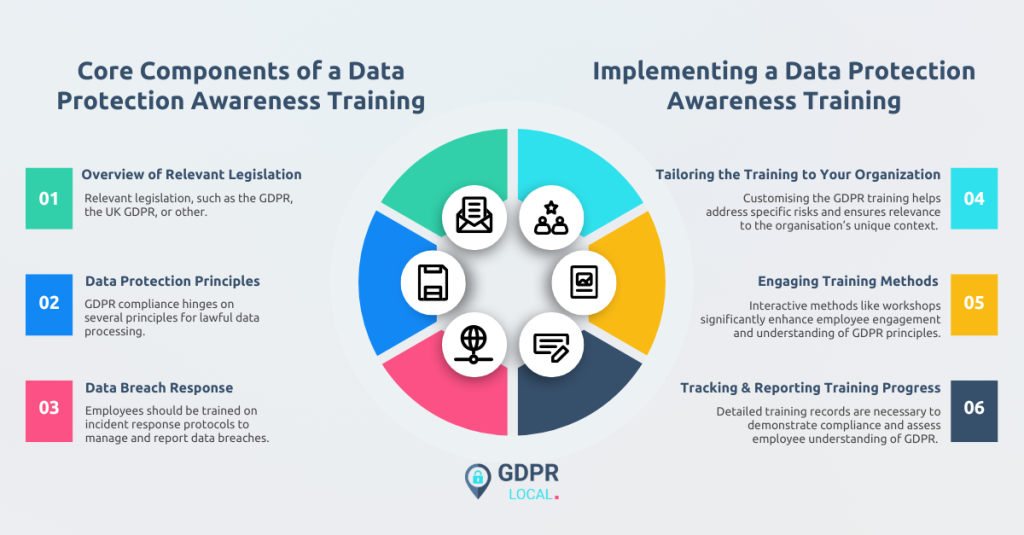
Tips for Effective Data Protection Awareness Training
Data protection awareness is key to preventing data breaches and complying with regulations. This article offers tips for practical employee training to enhance your organisation’s data security.
Key Takeaways
• Data protection awareness training is essential for cultivating a secure organisational culture and helping employees understand their responsibilities in preventing data breaches.
• Key components of practical training include relevant content, continuous education, and practical engagement methods, ensuring staff are well-informed about data protection regulations and risks.
• Ongoing training and refresher courses are crucial for adapting to evolving data protection laws, enhancing compliance, and reducing the likelihood of data breaches in organisations.
Understanding Data Protection Awareness
Data protection awareness is the cornerstone of a secure organisational environment. It promotes a culture where employees understand the importance of data security and their roles in preventing potential breaches. With the increasing incidences of data breaches, the need for an effective data security awareness training program has never been more pressing. This training aims to raise awareness about key concepts of data security and effective practices.
This induction training’s intended audience includes employees at all levels and sectors, underscoring its universal relevance. Thousands of organisations have already benefited from such training programs, highlighting their learning outcomes and effectiveness.
To truly grasp the essence of data protection awareness, it’s crucial to delve deeper into its importance and key definitions.
Importance of Data Protection Awareness
In 2019, 88% of UK companies faced data breaches, revealing a significant vulnerability that organisations must address. The threat is even more immediate for small businesses, with a successful hack occurring every 19 seconds. The consequences of data breaches extend beyond financial losses; they can lead to severe fines, legal claims, and irreparable damage to an organisation’s reputation.
The financial stakes are high, with the average data breach cost reaching $4.24 million in 2021. This underscores the critical need for GDPR awareness training, which educates employees on preventing security incidents and ensuring compliance with data protection regulations. Effective data protection measures, including comprehensive GDPR training, significantly reduce the risk of substantial fines for legislation breaches.
Businesses enhance customer trust by committing to data safety through comprehensive GDPR awareness training. A well-informed workforce lowers the chances of data breaches and reassures customers about the safety of their personal information, which is crucial for sales and retention.
Key Definitions in Data Protection
The General Data Protection Regulation (GDPR) is a comprehensive EU law governing the handling of personal data. Understanding key definitions is essential for navigating data protection responsibilities. Data controllers, for instance, are the entities that determine the purposes and means of processing personal data. Personal data refers to any information that can identify an individual, such as names, identification numbers, and location data.
Data processing encompasses various operations performed on personal data, including collection, storage, and deletion. The term “data subject” refers to individuals whose personal data is processed by an organisation. Under GDPR, consent must be informed, unambiguous, and freely given by the data subjects before processing occurs.
Comprehending these terms is fundamental to ensuring data protection compliance and safeguarding sensitive information.
Core Components of Data Protection Awareness Training
Effective data protection awareness training is built on several core components that ensure employees understand their data protection responsibilities. The training must be relevant, accurate, and current to be effective. Topics typically covered include data classification, secure processing methods, and compliance with privacy regulations.
Continuous education is crucial to inform employees about new data protection risks and compliance obligations.
Overview of Relevant Legislation
Key legislation, such as the General Data Protection Regulation (GDPR) and the UK GDPR, outlines the legal framework for processing personal data. These regulations mandate that businesses train employees on key data protection principles and the legal grounds for processing personal data. Evidence of training records is necessary for compliance, ensuring that organisations can demonstrate their adherence to data protection requirements.
Businesses must frequently update their mandatory training programs to comply with the latest data protection legislation changes. This involves actively monitoring regulatory body updates and integrating them into their training programs.
Data Protection Principles
GDPR compliance hinges on several principles for lawful data processing, including lawfulness, fairness, and accountability. The seven principles of GDPR are lawfulness, fairness, transparency, purpose limitation, data minimisation, accuracy, and integrity and confidentiality.
These principles ensure that data processing activities are transparent and accountable.
Data Breach Response
Employees should be trained on incident response protocols to effectively manage and report data breaches. Training equips them with crucial knowledge to avoid common errors that lead to data breaches. It also helps them adopt proactive security measures such as using strong passwords and updating software.
Data protection awareness training also enables employees to identify and report potential security threats more effectively.

Implementing Data Protection Awareness Training
Implementing an adequate data protection awareness training program is essential for empowering employees with the knowledge to manage sensitive information and meet compliance requirements. Well-trained employees serve as the first line of defence against compliance risks related to data protection.
Companies across various industries have successfully enhanced their data protection awareness by incorporating targeted training programs tailored to their needs.
Tailoring Training to Your Organization
Customising GDPR training helps address specific risks and ensures relevance to the organisation’s unique context. Data Protection training aims to inform employees about their legal obligations under GDPR and the impacts of data mismanagement.
Providing specialised training for roles with critical data protection responsibilities ensures compliance and relevance.
Engaging Training Methods
Interactive methods like workshops significantly enhance employee engagement and understanding of GDPR principles, making them essential for practical data protection awareness training.
Workshops and simulations allow employees to actively participate and practice their data protection skills in a safe environment, improving their retention of essential concepts.
Tracking and Reporting Training Progress
Detailed training records are necessary to demonstrate compliance and assess employee understanding of GDPR. Regular training helps organisations implement data protection policies and manage their information governance effectively.
Organisations can monitor employee understanding and ensure compliance with data protection protocols through regular course assessments.
Maintaining Ongoing Data Protection Awareness

Continuous learning is vital for organisations to adapt to new threats and regulatory changes. Regular refresher courses and keeping up with legislative changes are key tips to maintain ongoing data protection awareness.
Regular Refresher Courses
Refresher courses are essential to reinforce knowledge and adapt to new developments in data protection laws. Employees should undergo refresher training at least once a year to stay updated on data protection practices and regulations. Studies indicate that people forget a significant portion of learned material soon after training, making periodic updates necessary.
Scheduled refresher sessions help reinforce previously learned material and introduce new data protection practices.
Keeping Up with Legislative Changes
Due to the complexity and evolution of the General Data Protection Regulation, ongoing education and updates are necessary. Regular training keeps the workforce secure and helps them adapt to changing regulations.
Benefits of Data Protection Awareness Training
Organisations that have successfully implemented data protection awareness training often report reduced incidents of data breaches and improved compliance with regulations.
This section will explore the benefits in detail, including enhanced security practices, improved customer trust, and legal and financial safeguards.
Enhanced Security Practices
GDPR awareness training helps reduce data breaches caused by human errors and educates staff on cybersecurity risks. Company A utilised comprehensive training sessions to educate its staff on data protection protocols, significantly enhancing their overall data security practices.
Providing GDPR awareness training enhances security against cyber attacks and helps staff recognise malicious activity. After completing the training, participants receive feedback on their levels of participation and understanding of GDPR.
Improved Customer Trust
Demonstrating compliance through training can enhance customer perceptions of a company’s reliability. A well-trained workforce can significantly reduce the likelihood of consumer data mishandling incidents. Organisations prioritising data protection training often experience higher customer loyalty and long-term relationships.
Legal and Financial Safeguards
Staying informed about changes in data protection laws reduces the risk of compliance violations and associated penalties. Regular training on data protection minimises the likelihood of incurring substantial fines due to non-compliance.
Data protection training decreases legal liabilities in case of data breaches and complies with the Data Protection Act and data protection law.
Frequently Asked Questions
Why is data protection awareness training essential for my organisation?
Data protection awareness training is essential because it reduces the risk of data breaches and ensures compliance with regulations such as GDPR, which ultimately fosters customer trust in your organisation’s commitment to data security.
What are the core components of an adequate data protection awareness training program?
An effective data protection awareness training program should include an overview of relevant legislation, key data protection principles, and transparent data breach response protocols. It’s essential that the training remains relevant and is regularly updated to tackle emerging risks.
How often should employees undergo data protection training?
Employees should undergo data protection training at least once a year to ensure they remain informed about the latest practices and regulations. Regular refresher courses help maintain compliance and protect sensitive information.
What are the benefits of implementing data protection awareness training?
Implementing data protection awareness training significantly enhances security practices and improves customer trust. Additionally, it helps reduce legal and financial risks while ensuring better compliance with data protection laws.
Can you provide examples of companies successfully implementing data protection awareness training?
Companies like Company A and Company B have successfully implemented data protection awareness training, resulting in fewer data breaches and enhanced employee engagement and customer trust. These outcomes highlight the effectiveness of such training in promoting data security.